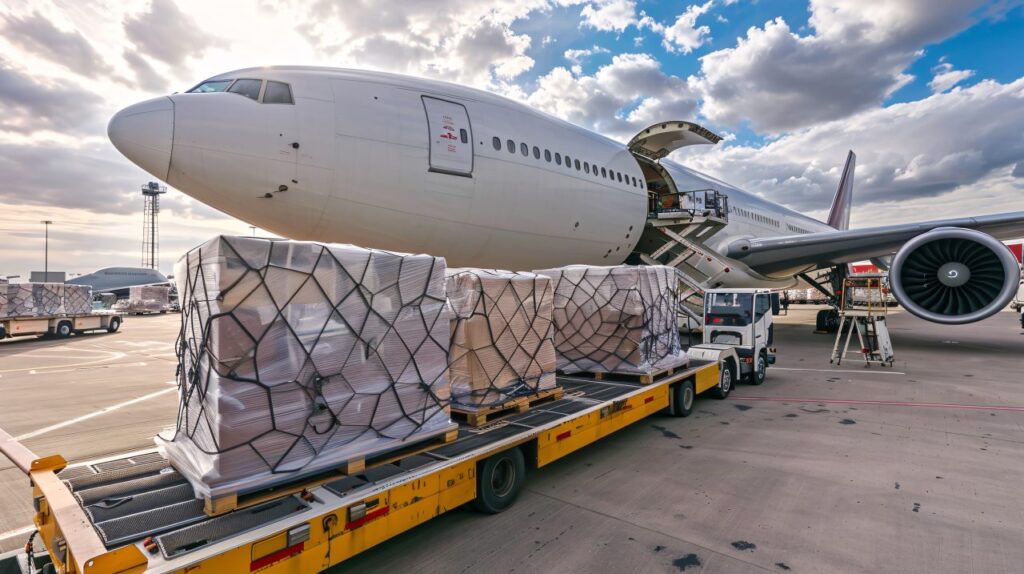- By TOP CHINA FREIGHT
- September 27, 2025
- Air Freight, Shipping
Table of Contents
Air freight from China to Saudi Arabia is a crucial logistics option for companies seeking speed, reliability, and global connectivity. With trade volumes between the two countries growing rapidly, understanding pricing, customs, and transit times has become essential. Businesses that ship goods by air can reduce delays, improve supply chain efficiency, and ensure customer satisfaction. This guide will walk you through costs, timelines, customs regulations, and strategies to optimize your shipments.

What factors affect air freight costs from China to Saudi Arabia?
Several key factors shape the total cost of air freight. Airlines typically charge based on chargeable weight, which can be either the actual weight or volumetric weight. Additionally, fuel surcharges, security fees, and peak-season demand influence rates.
Moreover, different airports in China (such as Shanghai, Shenzhen, or Guangzhou) offer varying costs due to their handling fees and service availability. Similarly, arrival airports in Saudi Arabia—like Riyadh, Jeddah, or Dammam—may differ in customs clearance charges.
How much does air freight from China to Saudi Arabia cost?

The average cost of air freight is calculated per kilogram, with bulk shipments enjoying lower rates. Below is a simplified cost table:
| Weight Bracket | Average Price (USD/kg) | Notes |
|---|---|---|
| 45 – 100 kg | $5.50 – $7.00 | Higher cost for smaller loads |
| 100 – 300 kg | $4.50 – $6.00 | Balanced rate |
| 300 – 500 kg | $4.00 – $5.50 | Economical for medium cargo |
| 500+ kg | $3.50 – $5.00 | Best option for bulk cargo |
Prices vary depending on airline availability, demand surges, and special cargo requirements like temperature control.
What is the transit time for air freight?
Air freight from China to Saudi Arabia typically takes 3–6 days, depending on whether the shipment is direct or requires transshipment.
| Route | Transit Time | Notes |
|---|---|---|
| Shanghai → Riyadh | 3–4 days | Direct flights available |
| Shenzhen → Jeddah | 4–6 days | May require transshipment |
| Guangzhou → Dammam | 3–5 days | Moderate frequency |
While air freight is significantly faster than sea freight, importers should also account for customs clearance, which may add 1–2 days.
Why choose air freight over sea freight?
Businesses often debate between air and sea freight. Here is a comparison:
Air freight is particularly suited for high-value goods like electronics, medical devices, luxury products, and urgent deliveries.
What customs documents are required?

Accurate documentation is vital to ensure smooth clearance in Saudi Arabia. Commonly required documents include:
| Document | Purpose |
|---|---|
| Commercial Invoice | Declares value of goods |
| Packing List | Lists items and weight |
| Air Waybill (AWB) | Proof of shipment |
| Certificate of Origin | Identifies product origin |
| Import License | Needed for restricted items |
Incomplete or inaccurate paperwork can cause costly delays. Therefore, working with an experienced freight forwarder is highly recommended.
Can businesses reduce air freight costs?
Combining shipments to reach higher weight brackets.
Using less congested airports to lower handling fees.
Minimizing dimensional weight.
Avoiding high-demand periods like before Ramadan or Chinese New Year.
Case study: How a Saudi retailer optimized shipments

A Saudi electronics retailer used to ship weekly loads of 100 kg from Shenzhen to Riyadh, paying about $6/kg. After switching to bi-weekly consolidated shipments of 400 kg, their rate dropped to $4.20/kg. Additionally, by routing some cargo through Guangzhou instead of Shanghai, they reduced airport handling fees. These adjustments saved the company over $10,000 annually while maintaining delivery reliability.
What industries benefit most from air freight?
Air freight is essential for industries where speed and safety are critical. These include:
- Electronics and IT hardware
- Pharmaceuticals and healthcare supplies
- Fashion and luxury goods
- Automotive spare parts
- Perishable goods like seafood and flowers
For such sectors, the higher cost of air freight is justified by reduced lead times and supply chain efficiency.
How should SMEs approach air freight?
Small and medium-sized enterprises (SMEs) may hesitate due to higher costs. However, air freight allows SMEs to compete effectively by ensuring faster delivery and meeting urgent customer demands. Many freight forwarders provide shared cargo services, enabling SMEs to enjoy competitive rates without booking full loads.
Therefore, SMEs should evaluate product type, customer expectations, and shipment frequency to decide whether air freight is the right option.
What challenges exist with air freight to Saudi Arabia?
Despite its advantages, air freight comes with challenges. Common issues include fluctuating fuel surcharges, limited cargo space during peak seasons, and stricter customs inspections for certain product categories.
Additionally, Saudi Arabia enforces specific regulations on packaging and labeling. For instance, some consumer products require Arabic labeling to pass customs smoothly. Businesses must stay updated on compliance requirements to avoid penalties.
Conclusion
Air freight from China to Saudi Arabia offers unmatched speed and reliability for businesses shipping high-value or urgent goods. Although it comes at a higher cost than sea freight, its benefits in supply chain efficiency, reduced risk, and faster delivery make it indispensable. By consolidating shipments, selecting optimal routes, and ensuring accurate customs documentation, companies can maximize value while minimizing expenses. Importers that understand these dynamics can better manage their logistics and remain competitive in the Saudi market.
Need a Shipping Quote?
If you want expert guidance and peace of mind, our team is ready to assist.
TJ China Freight offers tailored solutions to help businesses of all sizes ship more reliably from China.

FAQ
Q1:What is the average cost of air freight from China to Saudi Arabia?
The average cost ranges from $4 to $7 per kilogram, depending on weight, airline, and season. Larger shipments enjoy better per kilogram rates.
Q2:Which airports in Saudi Arabia receive most air freight from China?
Riyadh (RUH), Jeddah (JED), and Dammam (DMM) are the primary cargo hubs handling shipments from China.
Q3:Can perishable goods be shipped via air freight?
Yes, perishable goods like seafood, flowers, and pharmaceuticals are commonly shipped via air, using temperature-controlled cargo services.
Q4:How long does air freight take from China to Saudi Arabia?
On average, it takes 3–6 days, including flight time and customs clearance. Delays may occur during peak seasons.
Q5:Do I need an import license for air freight shipments?
Yes, certain product categories require import licenses in Saudi Arabia. It is essential to check regulations before shipping.
